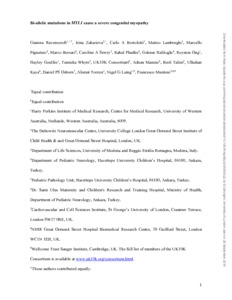Ravenscroft, G;
Zaharieva, I;
Bortolotti, CA;
Lambrughi, M;
Pignataro, M;
Borsari, M;
Sewry, CA;
Phadke, R;
Haliloglu, G;
Ong, R;
et al.
Ravenscroft, G; Zaharieva, I; Bortolotti, CA; Lambrughi, M; Pignataro, M; Borsari, M; Sewry, CA; Phadke, R; Haliloglu, G; Ong, R; Goullée, H; Whyte, T; UK10K Consortium; Manzur, A; Talim, B; Kaya, U; Osborn, DP; Forrest, A; Laing, NG; Muntoni, F
(2018)
Bi-allelic mutations in MYL1 cause a severe congenital myopathy.
Hum Mol Genet, 27 (24).
pp. 4263-4272.
ISSN 1460-2083
https://doi.org/10.1093/hmg/ddy320
SGUL Authors: Osborn, Daniel Peter Sayer
![[img]](https://openaccess.sgul.ac.uk/110184/1.hassmallThumbnailVersion/ddy320.pdf)  Preview |
|
PDF
Accepted Version
Available under License ["licenses_description_publisher" not defined].
Download (677kB)
| Preview
|
Abstract
OBJECTIVE: Congenital myopathies are typically characterised by early onset hypotonia, weakness and hallmark features on biopsy. Despite the rapid pace of gene discovery, approximately 50% of patients with a congenital myopathy remain without a genetic diagnosis following screening of known disease genes. METHODS: We performed exome sequencing on two consanguineous probands diagnosed with a congenital myopathy and muscle biopsy showing selective atrophy/hypotrophy or absence of type II myofibres. RESULTS: We identified variants in the gene (MYL1) encoding the skeletal muscle fast-twitch specific myosin essential light chain in both probands. A homozygous essential splice acceptor variant (c.479-2A>G, predicted to result in skipping of exon 5 was identified in Proband 1, and a homozygous missense substitution (c.488T>G, p.(Met163Arg)) was identified in Proband 2. Protein modeling of the p.(Met163Arg) substitution predicted it might impede intermolecular interactions that facilitate binding to the IQ domain of myosin heavy chain, thus likely impacting on the structure and functioning of the myosin motor. MYL1 was markedly reduced in skeletal muscle from both probands, suggesting that the missense substitution likely results in an unstable protein. Knock down of myl1 in zebrafish resulted in abnormal morphology, disrupted muscle structure and impaired touch-evoked escape responses, thus confirming that skeletal muscle fast-twitch specific myosin essential light chain is critical for myofibre development and function. INTERPRETATION: Our data implicate MYL1 as a crucial protein for adequate skeletal muscle function and that MYL1 deficiency is associated with a severe congenital myopathy.
| Item Type: |
Article
|
| Additional Information: |
This is a pre-copyedited, author-produced version of an article accepted for publication in Human Molecular Genetics following peer review. The version of record Gianina Ravenscroft, Irina T Zaharieva, Carlo A Bortolotti, Matteo Lambrughi, Marcello Pignataro, Marco Borsari, Caroline A Sewry, Rahul Phadke, Goknur Haliloglu, Royston Ong, Hayley Goullée, Tamieka Whyte, UK10K Consortium, Adnan Manzur, Beril Talim, Ulkuhan Kaya, Daniel P S Osborn, Alistair R R Forrest, Nigel G Laing, Francesco Muntoni; Bi-allelic mutations in MYL1 cause a severe congenital myopathy, Human Molecular Genetics, Volume 27, Issue 24, 15 December 2018, Pages 4263–4272 is available online at: https://doi.org/10.1093/hmg/ddy320 |
| Keywords: |
Genetics & Heredity, 06 Biological Sciences, 11 Medical And Health Sciences |
| SGUL Research Institute / Research Centre: |
Academic Structure > Molecular and Clinical Sciences Research Institute (MCS) |
| Journal or Publication Title: |
Hum Mol Genet |
| ISSN: |
1460-2083 |
| Language: |
eng |
| Dates: |
| Date | Event |
|---|
| 15 December 2018 | Published | | 12 September 2018 | Published Online | | 7 September 2018 | Accepted |
|
| Publisher License: |
Publisher's own licence |
| Projects: |
|
| PubMed ID: |
30215711 |
 |
Go to PubMed abstract |
| URI: |
https://openaccess.sgul.ac.uk/id/eprint/110184 |
| Publisher's version: |
https://doi.org/10.1093/hmg/ddy320 |
Statistics
Item downloaded times since 26 Sep 2018.
Actions (login required)
 |
Edit Item |



